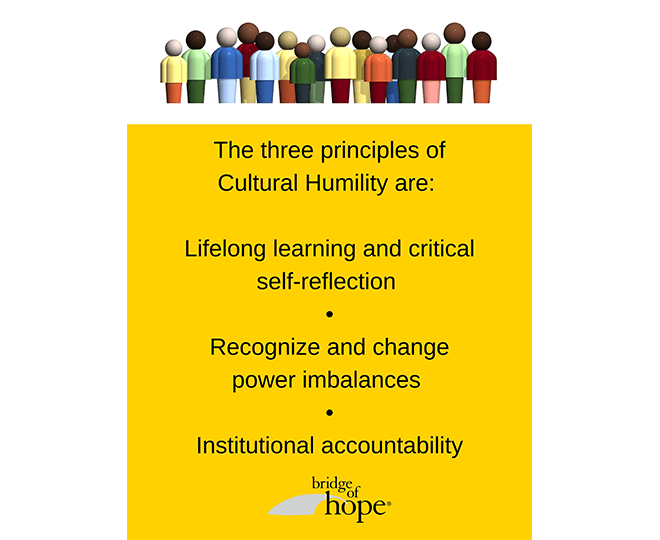COMMITMENT TO CULTURAL HUMILITY
March 1, 2021

Bridge of Hope serves with a spirit of cultural humility. Everyone has a unique story colored by the cultures within which we live and grow. To serve with a spirit of cultural humility is to approach others with a spirit of openness, setting aside assumptions, stereotypes, and even cultural “competencies” in order to know another through their own lens. Cultural humility invites us to discover, value, and even celebrate perspectives, experiences, traditions and choices that are different than our own. The three principles of cultural humility are: life-long learning and critical self-reflection, recognizing and challenging power imbalances, and creating institutional accountability. Cultural humility is a process that moves us along the continuum toward antiracism and equity.
What does Cultural Humility look like in Bridge of Hope? Recently a Neighboring Volunteer who took the time to learn about immigration issues while she was walking with a family from Ethiopia. Another Neighboring Volunteer engaged a potential landlord in conversation when he began raising questions about “the biracial children” of the mom applying for housing.
On January 21, 2021 our national board officially added a new fourth value, Practicing Cultural Humility, to our previous three organizational values. This is the first such addition to our Values Statement in our history. Including this value is a strong step forward for Bridge of Hope, as cultural humility is now part of our values as an organization.
4. Practicing Cultural Humility
- We practice cultural humility because our faith teaches us that everyone is our neighbor, equally valued and beloved by God.
- We practice cultural humility as the primary tool for advocating alongside those experiencing social injustices that perpetuate homelessness, including racism, sexism, and poverty.
- We practice cultural humility by equipping all who are involved with Bridge of Hope to grow and develop a deep understanding and utilization of the three tenets of cultural humility: life-long learning and critical self-reflection, recognizing and challenging power imbalances, and creating institutional accountability.
- We practice cultural humility by committing ourselves to becoming a network of staff, board, Neighboring Volunteers and supporters that represents the diversity of the kingdom of God.
